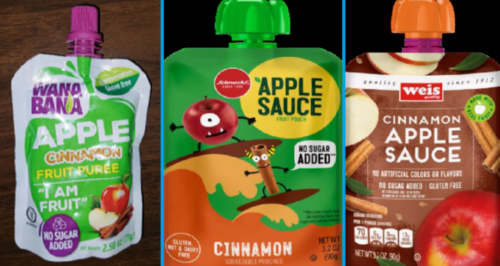Lead in baby food pouches: not a pretty story
A few weeks ago, the FDA announced volunary recalls of 3 brands of baby pouches containing apple sauce with cinnamon, because they contained excess lead.
Lead is poisonous to children’s nervous systems and brain development; there is no safe level of lead intake.
DO NOT LET YOUR KIDS EAT THESE PRODUCTS!

The FDA inspected the plant in Ecuador where cinnamon apple sauce is made; the amounts of lead were shockingly high. Food Safety News reports:
The applesauce, sold in pouches packaged for children, has been found to have a lead content of 5110 parts per million (ppm) and 2270 ppm. The international Codex body is considering adopting a maximum level of 2.5 ppm for lead in bark spices, including cinnamon.
What is even more shocking about this situation is how the FDA found out about the lead—not by testing but because
…a developing investigation by the North Carolina Department of Health and Human Services and the North Carolina Department of Agriculture & Consumer Services [found] about four children with elevated blood lead levels, indicating potential acute lead toxicity.
The state investigation identified WanaBana apple cinnamon fruit puree pouches as a potential shared source of exposure. As part of their investigation, the department of health and human services analyzed multiple lots of WanaBana apple cinnamon fruit puree, detecting extremely high concentrations of lead.
The FDA then announced it was investigating cinnamon as a source of the lead.
It traced the cinnamon to a supplier in Ecuador.
The FDA suspects that somewhere along the supply chain, someone deliberately added lead to the cinnamon to maintain its color and increase its weight.
This reminds me of the addition of Chinese melamine to pet food and infant formula in 2006 and 2007 (I wrote about the pet food scandal in Pet Food Politics: The Chihuahua in the Coal Mine).
This also points to the need for strengthening the FDA. It is not required to test products for lead and neither are manufacturers.
The FDA has proposed action levels for lead in foods, but these are neither final nor implemented.
The New York Times quoted Tom Neltner, safety expert at the Environmental Defense Fund:
That the levels of lead in children’s blood tends to be the first line of detection for lead in food is “effectively using kids as canaries…What this shows is a breakdown in the agency, and an industry that needs to be fixed.”
By industry, I’m assuming he means baby food and I could not agree more.
Pouches may be convenient for parents, but they promote sweet tastes and don’t teach kids how to eat real foods. One study concluded:
Squeeze pouch products available in Australia are nutritionally poor, high in sugars, not fortified with iron, and there is a clear risk of harm tothe health of infant and young children if these products are fed regularly. The marketing messages and labelling on squeeze pouches are misleading and do not support WHO or Australian NHMRC recommendations for breastfeeding or appropriate introduction of complementary foods and labelling of products. There is an urgent need for improved regulation of product composition, serving sizes and labelling to protect infants and young children aged 0–36 months and better inform parents.
That goes for U.S. products too.
Caveat emptor.

